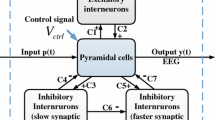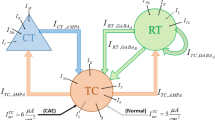Abstract
Closed-loop neural stimulation has been an effective treatment for epilepsy patients. Currently, most closed-loop neural stimulation strategies are designed based on accurate neural models. However, the uncertainty and complexity of the neural system make it difficult to build an accurate neural model, which poses a significant challenge to the design of the controller. This paper proposes an Adaptive Fuzzy Iterative Learning Control (AFILC) framework for closed-loop neural stimulation, which can realize neuromodulation with no model or model uncertainty. Recognizing the periodic characteristics of neural stimulation and neuronal firing, Iterative Learning Control (ILC) is employed as the primary controller. Furthermore, a fuzzy optimization module is established to update the internal parameters of the ILC controller in real-time. This module enhances the anti-interference ability of the control system and reduces the influence of initial controller parameters on the control process. The efficacy of this strategy is evaluated using a neural computational model. The simulation results validate the capability of the AFILC strategy to suppress epileptic states. Compared with ILC-based closed-loop neurostimulation schemes, the AFILC-based neurostimulation strategy has faster convergence speed and stronger anti-interference ability. Moreover, the control algorithm is implemented based on a digital signal processor, and the hardware-in-the-loop experimental platform is implemented. The experimental results show that the control method has good control performance and computational efficiency, which provides the possibility for future application in clinical research.















Similar content being viewed by others
References
Ahn H, Chen Y, Moore KL (2007) Iterative learning control: brief survey and categorization. IEEE Trans Syst Man Cyber Part C 37(6):1099–1121. https://doi.org/10.1109/TSMCC.2007.905759
Arlotti M, Rosa M, Marceglia S et al (2016) The adaptive deep brain stimulation challenge. Parkinsonism Relat Disord 28:12–17. https://doi.org/10.1016/j.parkreldis.2016.03.020
Bronstein JM, Tagliati M, Alterman RL et al (2011) Deep brain stimulation for Parkinson disease. Arch Neurol 68(2):165. https://doi.org/10.1001/archneurol.2010.260
Bu X, Hou Z (2018) Adaptive iterative learning control for linear systems with binary-valued observations. IEEE Trans Neural Netw Learn Syst 29(1):232–237. https://doi.org/10.1109/TNNLS.2016.2616885
Carron R, Chaillet A, Filipchuk A et al (2013) Closing the loop of deep brain stimulation. Front Syst Neurosci 7:112. https://doi.org/10.3389/fnsys.2013.00112
Castrioto A, Lhommée E, Moro E et al (2014) Mood and behavioural effects of subthalamic stimulation in Parkinson’s disease. Lancet Neurology 13(3):287–305. https://doi.org/10.1016/S1474-4422(13)70294-1
Chien C (2008) A combined adaptive law for fuzzy iterative learning control of nonlinear systems with varying control tasks. IEEE Trans Fuzzy Syst 16(1):40–51. https://doi.org/10.1109/TFUZZ.2007.902021
Chien CJ, Hsu CT, Yao CY (2004) Fuzzy system-based adaptive iterative learning control for nonlinear plants with initial state errors. IEEE Trans Fuzzy Syst 12(5):724–732. https://doi.org/10.1109/TFUZZ.2004.834806
Coles AS, Kozak K, George TP (2018) A review of brain stimulation methods to treat substance use disorders. Am J Addict 27(2):71–91. https://doi.org/10.1111/ajad.12674
Dayan E, Censor N, Buch ER et al (2013) Noninvasive brain stimulation: from physiology to network dynamics and back. Nat Neurosci 16(7):838–844. https://doi.org/10.1038/nn.3422
Douglas AB, Marina T, Andrew GA (2006) A survey of iterative learning control. IEEE Control Syst Mag 26(3):96–114. https://doi.org/10.1109/MCS.2006.1636313
Flöel A (2014) tDCS-enhanced motor and cognitive function in neurological diseases. Neuroimage 85:934–947. https://doi.org/10.1016/j.neuroimage.2013.05.098
Ge Y, Cao Y, Yi G et al (2019) Robust closed-loop control of spike-and-wave discharges in a thalamocortical computational model of absence epilepsy. Sci Rep 9(1):9093. https://doi.org/10.1038/s41598-019-45639-5
Ghasemi P, Sahraee T, Mohammadi A (2018) Closed- and open-loop deep brain stimulation: methods, challenges current and future aspects. J Biomed Phys Eng 8(2):209–216. https://doi.org/10.31661/jbpe.v8i2.898
Gigante PR, Goodman RR (2011) Responsive neurostimulation for the treatment of epilepsy. Neurosurg Clin N Am 22(4):477–480. https://doi.org/10.1016/j.nec.2011.07.003
Grant PF, Lowery MM (2013) Simulation of cortico-basal ganglia oscillations and their suppression by closed loop deep brain stimulation. IEEE Trans Neural Syst Rehabil Eng 21(4):584–594. https://doi.org/10.1109/TNSRE.2012.2202403
Iturrate I, Pereira M, Millán JDR (2018) Closed-loop electrical neurostimulation: challenges and opportunities. Curr Opin Biomed Eng 8:28–37. https://doi.org/10.1016/j.cobme.2018.09.007
Jams C (2023) Neuromodulatory control of complex adaptive dynamics in the brain. Interface Focus 13(3):20220079. https://doi.org/10.1098/rsfs.2022.0079
Jansen BH, Zouridakis G, Brandt ME (1993) A neurophysiologically-based mathematical model of flash visual evoked potentials. Biol Cybern 68(3):275–283. https://doi.org/10.1007/BF00224863
Kang W, Ju C, Joo J et al (2022) Closed-loop direct control of seizure focus in a rodent model of temporal lobe epilepsy via localized electric fields applied sequentially. Nat Commun 13(1):7805. https://doi.org/10.1038/s41467-022-35540-7
Laxpati NG, Kasoff WS, Gross RE (2014) Deep brain stimulation for the treatment of epilepsy: circuits, targets, and trials. Neurotherapeutics 11(3):508–526. https://doi.org/10.1007/s13311-014-0279-9
Li J, Li J (2014) Adaptive fuzzy iterative learning control with initial-state learning for coordination control of leader-following multi-agent systems. Fuzzy Sets Syst 248:122–137. https://doi.org/10.1016/j.fss.2013.10.010
Li Y, Min X, Tong S (2020) Adaptive fuzzy inverse optimal control for uncertain strict-feedback nonlinear systems. IEEE Trans Fuzzy Syst 28(10):2363–2374. https://doi.org/10.1109/TFUZZ.2019.2935693
Liu C, Wang J, Li H et al (2014) Model-based iterative learning control of Parkinsonian state in thalamic relay neuron. Commun Nonlinear Sci Numer Simul 19(9):3255–3266. https://doi.org/10.1016/j.cnsns.2014.02.008
Lozano AM, Lipsman N, Bergman H et al (2019) Deep brain stimulation: current challenges and future directions. Nat Rev Neurol 15(3):148–160. https://doi.org/10.1038/s41582-018-0128-2
Paulus W (2011) Transcranial electrical stimulation (tES–tDCS; tRNS, tACS) methods. Neuropsychol Rehabil 21(5):602–617. https://doi.org/10.1080/09602011.2011.557292
Rosin B, Slovik M, Mitelman R et al (2011) Closed-loop Deep Brain stimulation is superior in ameliorating Parkinsonism. Neuron 72(2):370–384. https://doi.org/10.1016/j.neuron.2011.08.023
Rouhani E, Jafari E, Akhavan A (2023) Suppression of seizure in childhood absence epilepsy using robust control of deep brain stimulation: a simulation study. Sci Rep 13(1):461. https://doi.org/10.1038/s41598-023-27527-1
Shan B, Wang J, Deng B et al (2015) UKF-based closed loop iterative learning control of epileptiform wave in a neural mass model. Cogn Neurodynamics 9(1):31–40. https://doi.org/10.1007/s11571-014-9306-0
Stanslaski S, Farooqi H, Sanabria DE et al (2022) Fully closed loop test environment for adaptive implantable neural stimulators using computational models. J Med Devices 16(3):034501. https://doi.org/10.1115/1.4054083
Starr PA, Ostrem JL (2013) Commentary on “adaptive deep brain stimulation in advanced Parkinson disease.” Ann Neurol 74(3):447–448. https://doi.org/10.1002/ana.23966
Sun FT, Morrell MJ (2014) Closed-loop neurostimulation: the clinical experience. Neurotherapeutics 11(3):553–563. https://doi.org/10.1007/s13311-014-0280-3
Tarsy D (2001) Deep brain stimulation and movement disorders. Epilepsy Behav 2(3):S45–S54. https://doi.org/10.1006/ebeh.2001.0215
Tong S, Li Y, Sui S (2016) Adaptive fuzzy tracking control design for siso uncertain nonstrict feedback nonlinear systems. IEEE Trans Fuzzy Syst 24(6):1441–1454. https://doi.org/10.1109/TFUZZ.2016.2540058
Tripoliti E, Martinez-Torres I, Frost E et al (2010) Effects of subthalamic stimulation on speech of consecutive patients with Parkinson disease. Neurology 76(1):80–86. https://doi.org/10.1212/WNL.0b013e318203e7d0
Wang M, Bian G, Li H (2016a) A new fuzzy iterative learning control algorithm for single joint manipulator. Arch Control Sci 26(3):297–310. https://doi.org/10.1515/acsc-2016-0017
Wang J, Niebur E, Hu J (2016b) Suppressing epileptic activity in a neural mass model using a closed-loop proportional-integral controller. Sci Rep 6(1):27344. https://doi.org/10.1038/srep27344
Wang Y, Chien C (2015) A fuzzy iterative learning control for nonlinear discrete-time systems with unknown control directions. In: 2015 54th IEEE conference on decision and control (CDC), 2015. IEEE, pp 3081–3086
Wendling F, Bellanger JJ, Bartolomei F et al (2000) Relevance of nonlinear lumped-parameter models in the analysis of depth-EEG epileptic signals. Biol Cybern 86:367–378. https://doi.org/10.1007/s004220000160
Wendling F, Benquet P, Bartolomei F et al (2016) Computational models of epileptiform activity. J Neurosci Methods 260:233–251. https://doi.org/10.1016/j.jneumeth.2015.03.027
Wendling F, Chauvel P, Biraben A, Bartolomei F (2010) From intracerebral EEG signals to brain connectivity: identification of epileptogenic networks in partial epilepsy. Front Syst Neurosci 4:154. https://doi.org/10.3389/fnsys.2010.00154
Woods AJ, Antal A, Bikson M et al (2016) A technical guide to tDCS, and related non-invasive brain stimulation tools. Clin Neurophysiol 127(2):1031–1048. https://doi.org/10.1016/j.clinph.2015.11.012
Wu W, Hatsopoulos NG (2008) Real-time decoding of nonstationary neural activity in motor cortex. IEEE Trans Neural Syst Rehabil Eng 16(3):213–222. https://doi.org/10.1109/TNSRE.2008.922679
Wu Y, Liao Y, Yeh W et al (2021) Directions of deep brain stimulation for epilepsy and Parkinson’s disease. Front Neurosci 15:680938. https://doi.org/10.3389/fnins.2021.680938
Yang Y, Connolly AT, Shanechi MM (2018) A control-theoretic system identification framework and a real-time closed-loop clinical simulation testbed for electrical brain stimulation. J Neural Eng 15(6):066007. https://doi.org/10.1088/1741-2552/aad1a8
Yu J, Dang H, Wang L (2018) Fuzzy iterative learning control-based design of fault tolerant guaranteed cost controller for nonlinear batch processes. Int J Control Autom Syst 16(5):2518–2527. https://doi.org/10.1007/s12555-017-0614-0
Yu Q, Hou Z, Bu X et al (2020) RBFNN-based data-driven predictive iterative learning control for nonaffine nonlinear systems. IEEE Trans Neural Netw Learn Syst 31(4):1170–1182. https://doi.org/10.1109/TNNLS.2019.2919441
Yu X, Hou Z, Polycarpou MM et al (2021) Data-driven iterative learning control for nonlinear discrete-time MIMO systems. IEEE Trans Neural Netw Learn Syst 32(3):1136–1148. https://doi.org/10.1109/TNNLS.2020.2980588
Yu M, Li C (2017) Robust adaptive iterative learning control for discrete-time nonlinear systems with time-iteration-varying parameters. IEEE Trans Syst Man Cybern Syst 47(7):1737–1745. https://doi.org/10.1109/TSMC.2017.2677959
Yuan Y, Long A, Wu Y et al (2022) Closed-loop transcranial ultrasound stimulation with a fuzzy controller for modulation of motor response and neural activity of mice. J Neural Eng 12:036046. https://doi.org/10.1088/1741-2552/ac7893
Zuo X, Martino AD, Kelly C et al (2010) The oscillating brain: complex and reliable. Neuroimage 49(2):1432–1445. https://doi.org/10.1016/j.neuroimage.2009.09.037
Funding
This work was supported in part by the National Natural Science Foundation of China under Grant 62303345, in part by the National Natural Science Foundation of China under Grant 62173241, in part by the National Natural Science Foundation of China under Grant 62071324, in part by the Tian** Municipal Special Program of Talent Development for Excellent Youth Scholars under Grant TJTZJH-QNBJRC-2-21 and in part by the National Natural Science Foundation of China under Grant 62103301.
Author information
Authors and Affiliations
Corresponding author
Additional information
Publisher's Note
Springer Nature remains neutral with regard to jurisdictional claims in published maps and institutional affiliations.
Rights and permissions
Springer Nature or its licensor (e.g. a society or other partner) holds exclusive rights to this article under a publishing agreement with the author(s) or other rightsholder(s); author self-archiving of the accepted manuscript version of this article is solely governed by the terms of such publishing agreement and applicable law.
About this article
Cite this article
Li, T., Wang, J., Liu, C. et al. Adaptive fuzzy iterative learning control based neurostimulation system and in-silico evaluation. Cogn Neurodyn (2023). https://doi.org/10.1007/s11571-023-10040-6
Received:
Revised:
Accepted:
Published:
DOI: https://doi.org/10.1007/s11571-023-10040-6




